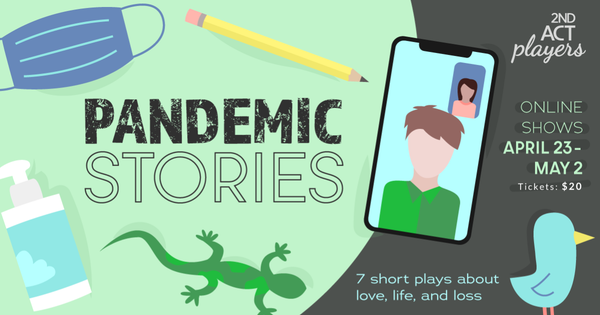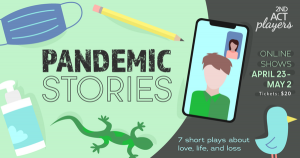
 Recommended!*** “Pandemic Stories: 7 Plays About Love, Life and Loss” consists of seven different self-contained stories by seven different playwrights, each having to do with some aspect of the effects of COVID-19 on the American family and the population at-large. These seven plays have won the 2nd Act Players new script competition for Spring 2021. Over 200 entries were submitted from around the globe and were initially whittled down to twenty, and then seven. Each of the constituent performances embodies a sobering perspective on what has happened to this nation over the last year and presents a different take on how individuals and families have adapted (or have failed to adapt) to new circumstances brought on directly or indirectly by the pandemic. From funerals and final messages to the repercussions of the stay-at-home orders, this timely show is an intimate take on the effects of current events and realities on contemporary life and death.
Recommended!*** “Pandemic Stories: 7 Plays About Love, Life and Loss” consists of seven different self-contained stories by seven different playwrights, each having to do with some aspect of the effects of COVID-19 on the American family and the population at-large. These seven plays have won the 2nd Act Players new script competition for Spring 2021. Over 200 entries were submitted from around the globe and were initially whittled down to twenty, and then seven. Each of the constituent performances embodies a sobering perspective on what has happened to this nation over the last year and presents a different take on how individuals and families have adapted (or have failed to adapt) to new circumstances brought on directly or indirectly by the pandemic. From funerals and final messages to the repercussions of the stay-at-home orders, this timely show is an intimate take on the effects of current events and realities on contemporary life and death.
While the various themes underlying the short plays are all excellent in their own way, some stories are better than others. One of my personal favorites is Donna Latham’s “Lunch Lady”, the presentation that opens the show. Three different lunch ladies in Texas describe their own unique experiences when schools closed. The first lady speaks about not seeing the kids anymore and how the pandemic has affected her financially. The second lady speaks about distributing food to needy families from the trunk of her car. The third lady speaks about her own food insecurity growing up. This nicely sets the tone for the next six sequences, all of which are heartfelt with the occasional comedic breather. Another of my favorites is “What Good Did We See Today? by Cathrine Goldstein. In an extraordinary performance, Manny Schenk channels George, an old man with dementia as he slowly but steadily declines between March 2020 and February 2021. Among other things, he confuses his two daughters and fails to understand the restrictions on his activities due to shelter-in-place orders. Other short plays include: “Second Acts, Second Helpings” by John Mabey, “Love in the Time of Covid-19” by Germaine Shames, “[Brackets]” by Craig Gustafson, “The Birds Are Feeding Me” by Rex McGregor, and “To the Zoom and Back” by Cindi Sansone-Braff.
Cast members Nick Dorado, Valerie Gorman, Brandy Miller, Manny Schenk, Matthew Schufreider, and Anne Tracy rehearsed for three nights a week for eight weeks on Zoom, socially isolated from each other, in front of green screens, using their own video cameras. Director, artistic director, and editor John N. Frank wore different hats as he pulled the pieces of the production together to turn them into one 90-minute recorded video. Because two characters couldn’t both talk at the same time on Zoom, director Frank had to modify some scripts. Editor Frank used FinalCut Pro to provide virtual backgrounds and make the actors appear as if they were sharing scenes. Then he arranged the sequences and added B-roll video footage to mark the end of each snippet.
From how our “new normal” has impacted intimacy and family relations to its effect on earning a living and socializing with others, this year has been like no other. It was interesting to watch how different playwrights have dealt with different aspects of this once-in-a-century megaevent, especially when you consider the massive toll that COVID has taken on so many people in this country and worldwide.
Performances of “Pandemic Stories” are available for viewing on-demand via their YouTube channel.. For more information about “Pandemic Stories”, or to order your tickets , please go to
https://evanston2ndactplayers.com/pandemic-stories-advance-ticket-sales
Available through May.
For more information about 2nd Act Players and future shows that feature stories that deal with major “second acts” in people’s lives, please turn to: https://evanston2ndactplayers.com/.
To see what others are saying, visit www.theatreinchicago.com, go to Review Round-Up and click at “Pandemic Stories”.






1 thought on ““Pandemic Stories” reviewed by Julia W. Rath”